Meet our pioneer: Victor Brouwers
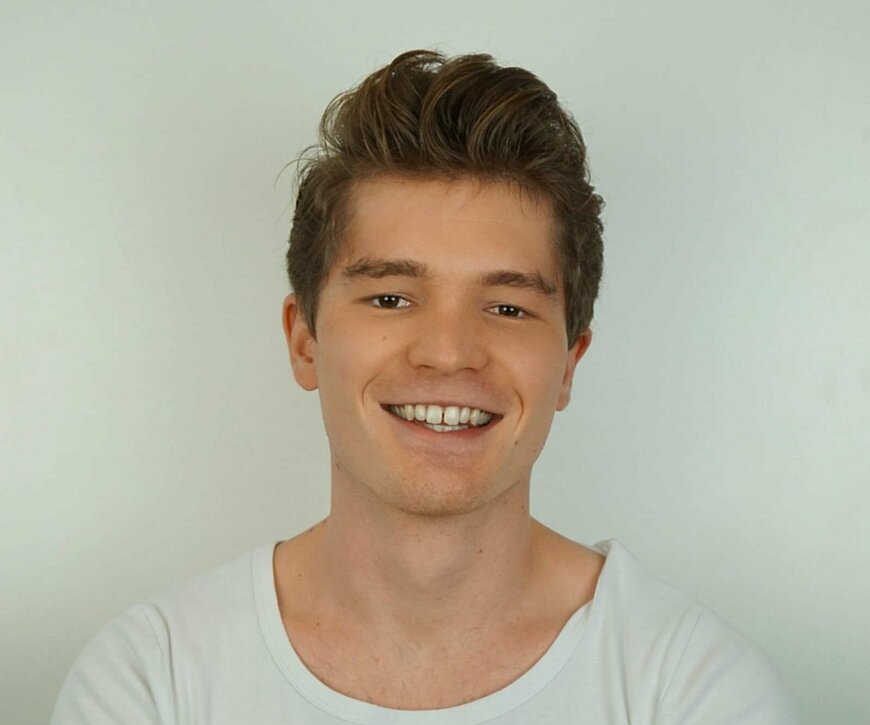
In Brainport Eindhoven we change the world because here we develop key technologies that change society. We can only do that because of our pioneers. Therefore, we would like you to meet one of our pioneers: Victor Brouwers.
Who are you?
My name is Victor Brouwers. I am 23 years old and I come from Den Bosch. In the second year of my studies, I moved to Eindhoven, where I now live in a student room.
What do you study?
I am now in the second year of the master of Applied Physics at TU/e. I have opted for the Nano direction. Then you’re working on quantum technology on a very small scale and that’s very interesting. You look at the atomic scale, and I think that's the best part of physics.
"You are looking at the atomic scale anyway and I think that is the most beautiful part of physics."
Victor Brouwers
In physics, you are concerned with how something works down to the smallest level. In my opinion, there is nothing more interesting than looking at the atomic level to see how you get from a few atoms or electrons to the world we see around us. That concept is cool and you often misunderstand how small ‘small’ is. To put it in perspective, let's take the precision level of ASML's machines as an example: that's like taking a flashlight and hitting a 50-cent coin on the moon with the light from the flashlight. That is the precision in the machines they develop: bizarre! I think it's cool to understand that, to be able to manipulate it and then to build around it.
Why did you choose this study?
I was originally triggered by the fact that you could study nuclear fusion at TU/e. I just thought that was a really weird concept. I just didn't do anything with that, because in the end there were other things that I found more interesting. But that's how it was that at the open days I heard people talking about applied physics and that's exactly what I wanted to do: think forward-looking and create something new that would almost change your view of the world.
"That was exactly what I wanted to do: to do some real forward thinking and set up something new that would almost change your view of the world."
Victor Brouwers
The reason I liked nuclear fusion so much in the first place was the bizarre concept that you control a kind of sun on earth and that you could get all the energy that one Dutch household uses in 1 year from a bottle of water. I look almost cynically at the climate problem; aren't we just waiting for nuclear fusion to work and provide a solution? That would be a really big step. Anyway, people have been saying for 40 years that nuclear fusion will be finished in 5 years, and they are still saying that now.
I am fascinated by how the world works. You sometimes find out how limited your intuition is and how inaccurate everyday impressions of the world can be. The method to find that out is also very interesting. You end up in a very intuitive way of thinking, but you have to take purely logical steps. You see afterwards why such a thinking step still contains a strange intuition that isn’t based on anything. That’s very frustrating, but also fun once you get through it.
What have you done besides your studies?
In my second year of the bachelor, I did the Honors Academy. That was a European project in which we were going to link self-driving cars to smartphones. Sometimes international software engineers were flown in, such as people from Huawei, and then you would work together full-time for a week. That was super cool. They eventually asked me if I wanted to continue to work on the project with a fellow student.
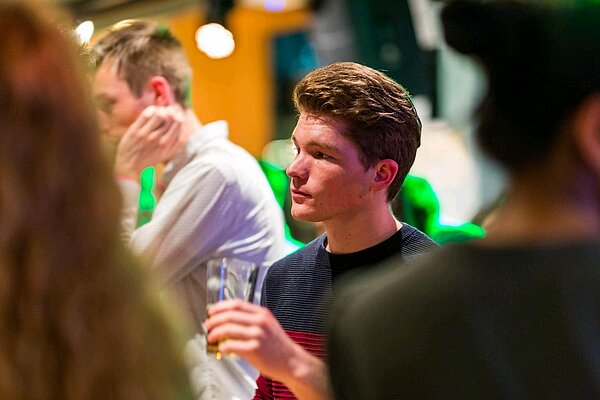
At the same time, I started a teaching trajectory from the TU/e, to obtain a teaching certificate for secondary school. And when I did an internship at a secondary school in my third year, they asked me to continue working there as a part-time job.
In my third year, I chose to chair the Honors students association and to do a summer school in China, with a rather long preparation process. That was a pretty big year, and took more effort than expected. That's why I postponed my study a bit. In the fourth year of my bachelor's degree, I got a little more rest, because you have to keep a bit of balance in it.
Why did you want to get your teaching certificate?
In high school, I always thought tutoring wasn’t for me because I was afraid I would get frustrated too quickly if people didn't understand something fast enough. Then I decided to do that during my studies because I was looking for a new part-time job. I got through the subjects in my high school very easily and I had already given people 1-on-1 tutoring. I quite liked that. If you go through the process with someone of not understanding something in the beginning, that you then go through the method of stepping through it rationally and that it clicks at the end of the ride: that is a very nice moment! In the end, we merged with a secondary school with the study guide and after we finished exams there started teaching chemistry because a teacher had dropped out. That was fine to do. When I saw that teacher training at TU/e was an option, there was no reason for me not to do it. I enjoy talking about physics and if others learn something from it, that's great. A disadvantage is that you partly had to play a police officer in the schoolyard and I that was not what I wanted to do. You also notice that not everyone has fun in learning; some you have to drag to a 5.5. That's not a bad thing, but it doesn't motivate me.
"When you go through the process of not understanding something at the beginning together with someone, then go through the method of stepping through it rationally, and then it clicks at the end: that is a very beautiful moment!"
Victor Brouwers
Have you specifically chosen the Honors project on Smart Mobility?
I discovered in my first year that I was not good at programming. For me, programming is a textbook example of something where you have to take perfectly rational steps, which is not something I was good at. I still wanted to develop myself in programming and that's why I was looking for a project in which I could do that in a fun way. I could have built a website, but that was not tangible enough for me. I wanted to see in an application how it worked there. Smart Mobility offered that. That's how I ended up with this Honors project.
You are also still part of a student team.
I once joked with friends that I had done everything at uni, except be part of a student team.
In the summer of 2020, Mariia Turchina approached me, because she knew that I also found the topic Team HART deals with very interesting. There was no student team involved in human augmentation yet, so she asked me if I wanted to help set it up. We did that and now we have 17 members. The nice thing is that we weren't very active with the recruitment at all, but it just worked out.
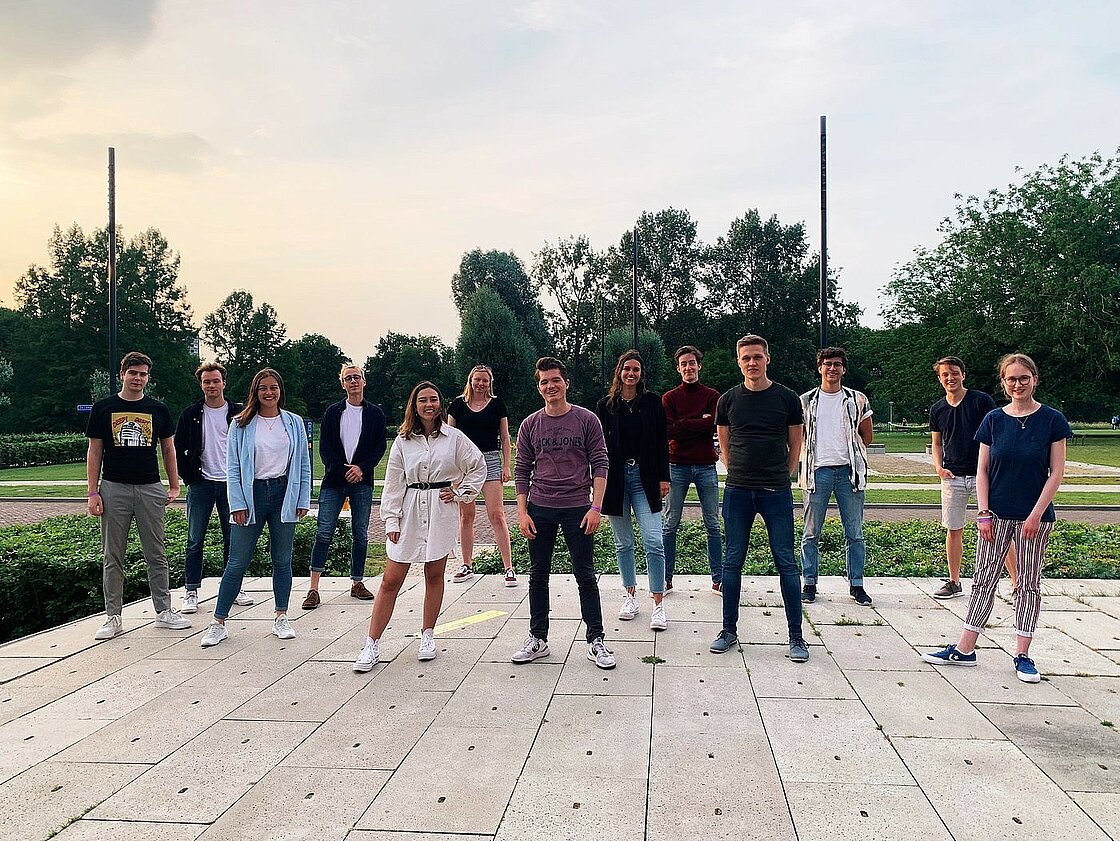
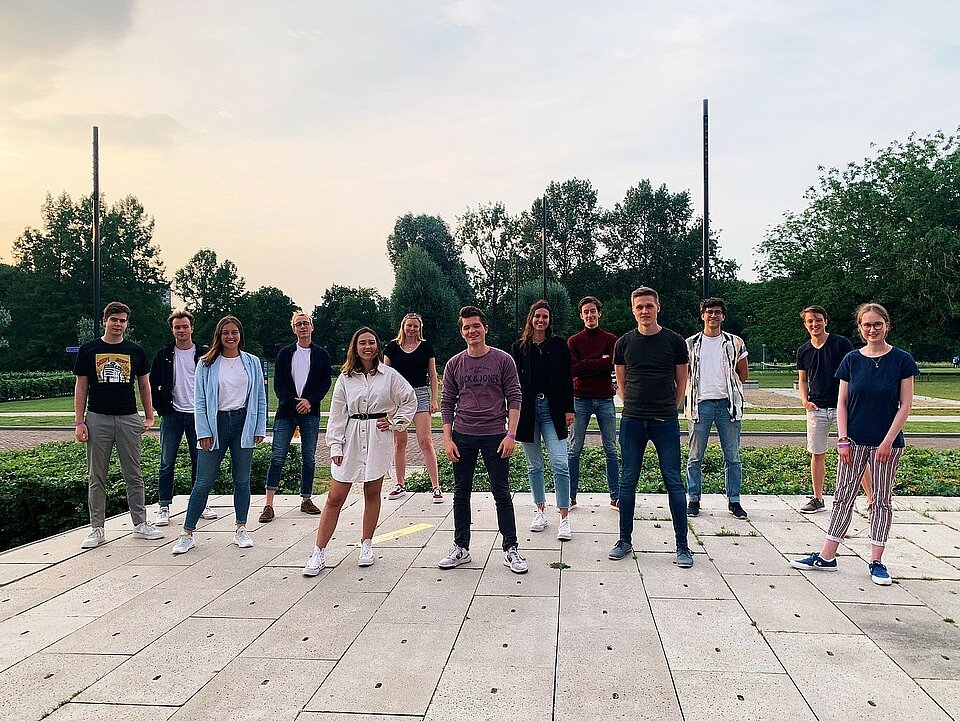
But of course, the main reason for me was not being able to tick a student team off my list. In high school, I saw David Eagleman's TED Talk on this subject and I was already completely triggered by the concept that you can make people completely malleable. That you can enhance people. If you get more knowledge on that topic, you will be able to give people who are blind or deaf many more benefits than they have now. If you really understand how it works, it doesn't matter at all whether you are blind or deaf. The best thing would be if you could completely personalize how you experience what is happening in the world. That you suddenly feel that the bushfires in Australia are raging, that a politician's speech is not going so well or that money has just been debited from your bank account. That's just part of your daily experience, that's what I thought was such a fascinating idea. And although I had planned to slow down a bit during my master’s, I couldn't resist the idea of forming a student team on this subject.
What have you learned from this student team?
A large part is in setting up the brand, the identity of the student team. We spent quite a bit of time figuring out how to brand our idea for the outside world. Setting up the team was also fun. With the original six co-founders, we wanted to move towards a system in which new people also fully own the idea of the team. We, therefore, wanted to try to work without a hierarchical structure. We gave that a lot of attention. Now we don't have a board and we work with a very flat hierarchy. Everyone has a big responsibility and is fully trusted. Creating that culture may have been the biggest learning step. And it remains a process that you always have to go through: every time a new member comes with all kinds of questions that he or she could find out on their own, you have to let go and give that person the space to discover it for themselves. That’s difficult in the beginning, but after some time, it works very quickly and smoothly.
What do you want to do next?
I don't know yet whether I want to do my PhD after my master's degree or whether I want to work directly in the business world. Suppose I would like to do my PhD and suppose I could do that in Beijing, where I also have my graduation internship, then I have to think carefully about what I would like. It is a once-in-a-lifetime opportunity.
The reason why I would like to do a PhD is that it can be very helpful when one would like to teach at university. That appeals to me. Then you also work with students who do that study for a reason. I think that’s great. What is less appealing to me when doing a PhD is the focus on academia. This makes me think that maybe I do not like it enough to just focus on physics. But of course, you do have people who work partly at university and partly in business. I would think something like that would be awesome. And then it is almost a must to get a PhD. So I still have a bit of consideration to do. And then there are other things to consider, too, such as whether you can find a nice project. If you're going to be working on something for four years, you have to like the subject. And on the other hand, what if something cool in business comes along? Or you can start a startup for the same money. Then no promotion is necessary. I realize that this is a luxury problem, though.
"Of course, you do have people who are partly working at the university and partly in business. I would find something like that very cool."
Victor Brouwers
Would you like to set up a startup?
I would love that, but I'm not a purebred entrepreneur. I’d only like it if the startup then focuses on an idea that matches with my ideals. That was the case with Team HART. But not just to make money. I would rather work for a company that I find interesting. But if I do have a really good idea, then I do have a group of friends around me to set up a startup together. That would be very nice. And vice versa: if friends have a cool idea, I won't miss that opportunity.
"If I do have a really good idea, I'll have a group of friends around me to start a start-up with."
Victor Brouwers
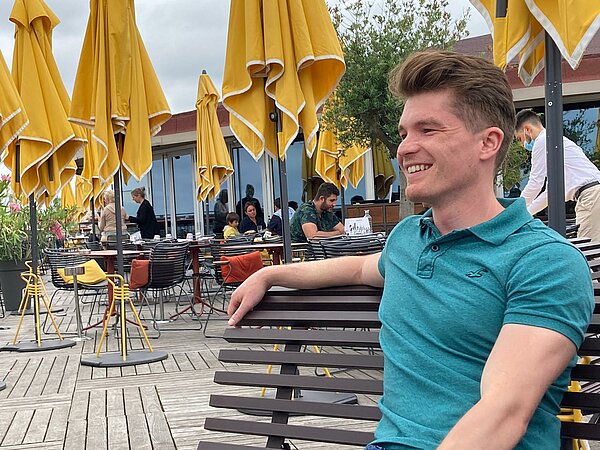
What do you find important about a job?
There has to be the space to process your ideas, to a certain extent. Falling into a pattern in which you are doing too much-planned work would be a real shame. The technical direction is very interesting, but it’s not so people-oriented. It’s far away from human contact. I'd like it if that was included. I'd miss it if that's all gone. I'm looking for that combination. It would also be nice to be able to tackle a new problem every time.
What do you think about studying and living in Brainport Eindhoven?
I like it here. What I particularly like about the region is that if you want to pursue your passion, be it within or outside your studies, there are many possibilities. If you just look at the Honors Academy, you already have 9 directions to choose from. Then I haven't even mentioned what you can do in the Innovation Space. There are also simple examples of people who have a cool idea for a subject and who will further develop it in the TU/e Innovation Space. We are almost taking for granted how beautiful that is. At TU/e, we are given the opportunities, also financially, and also the confidence to work out ideas. That is of course fantastic. In that respect, I think this is a very nice environment. And as a result, you quickly come into contact with like-minded people. I do have to give a big thank you to Eindhoven for that.
"What I particularly like about the region is that if you want to pursue your passion, be it within or outside of your studies, there really are a lot of possibilities."
Victor Brouwers
What else would you like to tell (future) students in Brainport Eindhoven?
Don't be too shy to tackle those things you think you'd like to do, even though you wonder if you're good enough, if you have enough time, or if it's fun enough in the long run. term. Don't dwell on that for too long. The moment you think something looks great to you: just go right after it. If it's nothing, then it's nothing and you'll be done in a few weeks. But very nice things can come out of it.